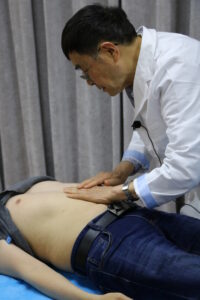Case Study from The Jingfang Case Studies and Medical Treatises of Dr. Lou Shao-kun by Lou Shenshan
The following case study comes from The Jingfang Case Studies and Medical Treatises of Dr. Lou Shao-kun by Lou Shenshan, translated by Will Ceurvels, scheduled to be released by Purple Cloud Institute in the next weeks.
In this volume, Dr. Lou Shao-kun, a formidable clinician and intellect regarded as one of the twentieth century’s premier practitioners and scholars of jīngfāng herbalism, takes you step by step through his clinical process in this collection of over 70 case studies and his large corpus of medical essays.
Cough, Panting and Chest Oppression Treated with Mu Fang Ji Tang
Combined with Ting Li Da Zao Xie Fei Tang (Excerpt)
Ms. L, 80 years (152cm, 65kg)
First Visit: September 9th, 2005
Chief Complaint: Cough, asthma, and expectoration of phlegm for 2 years.
History: Two years ago, the patient was found to have hypertension, heart failure, and Parkinson’s disease and was hospitalized several times. Her symptoms were primarily chest oppression, panting, cough with copious phlegm, and severe constipation. Her condition was severe enough that she was unable to live on her own. One year ago, after undergoing surgery at a large hospital for gallstones, she developed pneumonia, which exacerbated her coughing and asthma, and caused the production of copious phlegm that was difficult to expectorate. At times, her condition was so severe that she would have to sit up all night coughing up phlegm, unable to lie flat on her back, which significantly impaired her sleep quality. In the course of a single year, she was hospitalized four times and was listed as in critical condition several times. She didn’t want to pass away in the hospital, so she decided to return home and seek Chinese medical treatment.
Current: The patient has a robust build with a short, overweight stature, and a dark red complexion. She appears anxious and fearful and complains of chest oppression, chest fullness, agitation, and dry mouth with desire to drink water. She coughs and pants constantly all day and night and her copious phlegm is yellow, sticky, malodorous, and difficult to expectorate. Additionally, she complains of constipation with bowel movements occurring only once every few days, incontinence, and frequent urination with yellow malodorous urine. Her legs display pitting edema.
Pulse: Tight and replete
Tongue: Dark red with a thick white coating
Abdominal palpation: Substernal hard glomus and tightness, abdominal muscles are tight and not vacuous.
Diagnosis: Mu Fang Ji Tang Pattern and Ting Li Da Zao Xie Fei Tang Pattern
Formula: Han Fang Ji 10g, Sheng Shi Gao 100g, Gui Zhi 15g, Dang Shen 10g, Ting Li Zi 15g, Da Zao 10 pieces, Mang Xiao 10g (dissolve in prepared decoction), Fu Ling 30g. (Five packets, one packet per day)…..
Clinical Insight (Excerpt):
Dr. Yue Mei-zhong (岳美中) stated: “In chronic diseases, one should not be too quick to change formulas.” While keeping in mind the need to treat to the pattern, it is very important in chronic diseases to keep with a formula and not change it too cavalierly. The treatment process in this case is a prime example of the importance of this treatment principle.
“The “Lung Wilting, Pulmonary Welling-Abscess and Cough with Qi Ascent Disease, Pulse, Pattern and Treatment” chapter in the Essential Prescriptions of the Golden Cabinet (金匱要略) states: “When there is pulmonary welling-abscess and an inability to lie flat with panting, Ting Li Da Zao Xie Fei Tang is indicated.” Also, “When there is pulmonary welling abscess, fullness and distention in the chest, full-body edema, nasal congestion, rhinorrhea, loss of sense of smell, counterflow cough, qi ascent, wheezing, and congestion, Ting Li Da Zao Xie Fei Tang is indicated.” The majority of commentaries interpret “pulmonary welling-abscess” (肺癰, fèi yōng) as referring to a pulmonary abscess, while only a few interpret it as meaning “lung congestion”. Recently, Professor Li Jin-yong (李今庸) has also expressed support for its interpretation as “congestion.” That being said, the majority of modern textbooks still interpret it as “pulmonary abscess”. Clearly, there is a need to reevaluate this interpretation. “

Would you like to subscribe to our newsletter?
If you enjoyed reading this please consider supporting us!
When we started the Purple Cloud Institute, our aim was to make accessible educational material about traditional Chinese cultural practices. We strive to keep prices of our books as affordable as possible and the content we provide free of charge. However, there are many ongoing behind the scenes costs and the time taken to provide such content is considerable.
If you have enjoyed our offerings please consider donating and supporting us. The help will allow us to make time to bring you more in the way of book publications, podcasts and videos about tradition-based Daoist, Chinese medicine and martial arts and help keep these traditions alive.
Your assistance is greatly appreciated!
